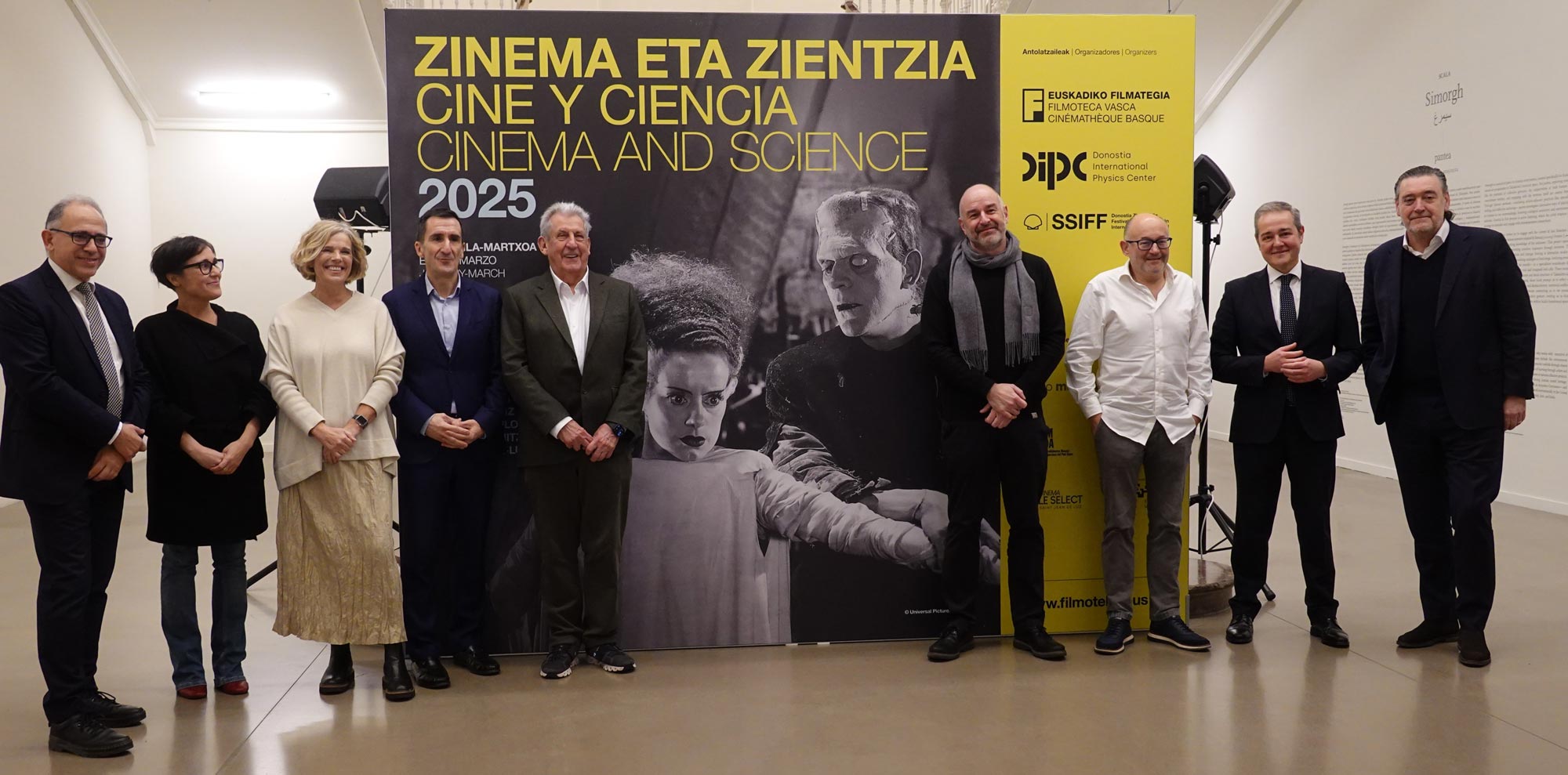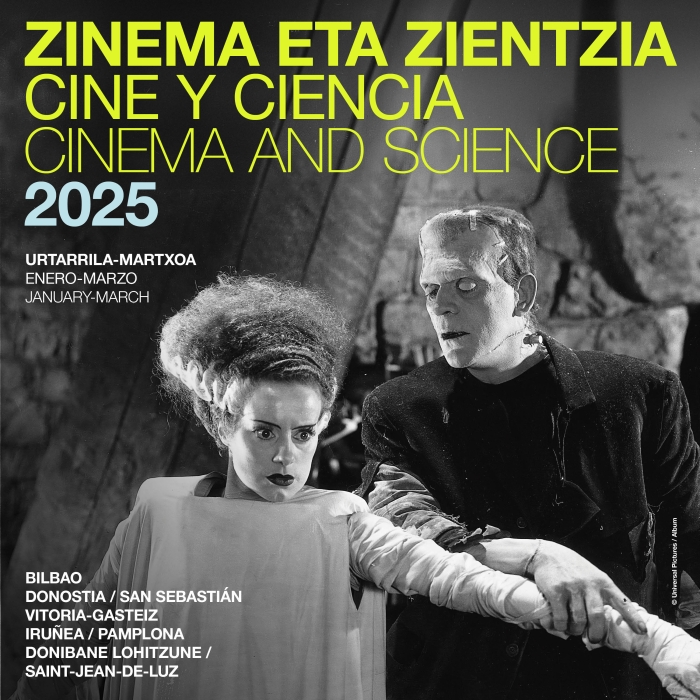The social sciences are included for the first time in the programme with Vincere (Marco Bellocchio, 2009) to depict the phenomenon of the rise of fascism.
The Bride of Frankenstein (James Whale, 1935) stars in this year's line-up; this film plus Frankenstein (1931) will form a double feature.
Around twenty scientists will be debating with the audience at the screenings to take place between January and March in Vitoria, San Sebastian, Bilbao, Pamplona and Saint-Jean-de-Luz.
The eighth edition of the Cinema and Science series aims to dissect the concept of time through twelve films to be screened between January and March in Vitoria (Artium Museoa), San Sebastian (Tabakalera International Centre for Contemporary Culture), Bilbao (Bizkaia Aretoa Mitxelena Room of the UPV/EHU), Pamplona (Golem Baiona cinemas) and Saint-Jean-de-Luz (Cinéma Le Sélect). In this proposal organised by the Basque Film Archive, the Donostia International Physics Center (DIPC) and the San Sebastian Festival, the audience will also have the chance to discuss with some twenty scientists of international renown issues such as black holes, time travel, the multiverse and creating life artificially.
The press conference held today in San Sebastian was attended by Joxean Fernández, director of the Basque Film Archive; Ricardo Díez-Muiño, director of the DIPC; Edurne Ormazabal, general director of Tabakalera; Adolfo Morais, deputy minister for Universities and Research in the Basque Government; and Andoni Iturbe, deputy minister of Culture in the Basque Government. The event was also attended by Pedro Miguel Etxenike, president of the DIPC; Miguel Zugaza, director of the Bilbao Museum of Fine Arts; José Luis Rebordinos, director of the San Sebastian Festival; Beatriz Herráez, director of the Artium Museoa; and Xabi Garat, responsible for Le Sélect cinemas in Saint-Jean-de-Luz.
The series, which has set out to transmit cinematographic and scientific culture ever since its first edition, was defined by Joxean Fernández as "a celebration of art and knowledge in which we expect film quality, as always, but in this case also that the films should be capable of allowing a stimulating scientific gaze. And this will be achieved thanks to the amazing line-up of film makers and scientists in this year's edition".
Díez-Muiño went on to recall "the success of this series among the general public with over 5,600 spectators in 2024" and stressed that "bringing cinema and science together has allowed us, firstly, to show that science is an integral part of culture and an intrinsically human activity and, secondly, to provide a different, original look at cinematographic creations, thus enriching their meaning".

The films
The series kicks off tomorrow, Thursday 9 January, at Artium Museoa with The Theory of Everything (James Marsh, 2014), a journey through part of the life of the physicist, astrophysicist, cosmologist and populariser Stephen W. Hawking, an expert on black holes; it will be presented by Pedro Miguel Etxenike, Prince of Asturias Award winner and president of the DIPC, in San Sebastian (10) and Bilbao (11). In Vitoria (9) and in Pamplona (14) it will be presented by the Ikerbasque Research Professor at the DIPC and Director of Strategic Programmes Arantzazu García-Lekue.
This year the classics include The Time Machine (George Pal, 1960), based on the novel by H. G. Wells and which introduced the concept of time travel; the double bill comprising Frankenstein and The Bride of Frankenstein (James Whale, 1931, 1935) portrays a scientist's challenge to bring inanimate bodies back to life; and the modern horror classic The Thing (John Carpenter, 1982), which portrays the struggle between scientists and an alien in the Antarctic.
More recent titles will also be programmed, such as High Life (Claire Denis, 2018), which competed at the San Sebastian Festival and addresses issues such as black holes, reproductive experiments and life in space; the seven-time Oscar winner Everything Everywhere all at once (Daniel Kwan and Daniel Scheinert, 2022), an invitation to enter the multiverse; and Marguerite's Theorem (Anna Novion, 2023), the portrait of a female mathematician in the last year of her PhD thesis (screening as part of the Emakumeak Zientzian festival).
The Basque Film Archive also proposes exploring lesser-known works such as Operation Swallow: The Battle for Heavy Water (Jean Dréville, Titus Vibe-Müller, 1948), a blend of non-fiction and adventure that will bring us closer to the race for the atomic bomb during WW2; The Deep (Baltasar Kormákur, 2012), a film that explores the limits of the human body; and Vincere (Marco Bellocchio, 2009). Thanks to this latter film, which narrates the rise to power of Benito Mussolini through the story of Ida Dalser, his first wife, the social sciences are included for the first time in this series, with historians Julián Casanova and Antonio Rivera addressing the rise of fascism during the inter-war period.
Finally, Cinema and Science will be programming Erin Brockovich (Steven Soderbergh, 2000), in which Julia Roberts plays an environmental activist, and Sachs' Disease (Michel Deville, 1999), awarded Silver Shell in the San Sebastian Film Festival for Best Director and Best Screenplay, and which describes the life of a village doctor whose virtue is his ability to listen (screening in collaboration with BioGipuzkoa).
The programme will be screened in its entirety in San Sebastian, Bilbao, Vitoria and Pamplona, while in Saint-Jean-de-Luz there will be a chance to enjoy Vincere, The Theory of Everything, Marguerite's Theorem, Gravity and Operation Swallow: The Battle for Heavy Water.
The presenters will be: Pedro Miguel Etxenike (Emeritus professor of condensed-matter physics of the University of the Basque Country (UPV/EHU) and president of the DIPC and the CFM); Arantzazu García-Lekue (physicist, Ikerbasque Research Professor and director of the DIPC's Strategic Programmes); Maria Navarro-Gastiasoro (physicist, a DIPC researcher in exotic superconductivity and correlation in quantum materials); Antonio Rivera (professor of contemporary history at the UPV/EHU's Faculty of Arts); Julián Casanova (professor of contemporary history at the University of Zaragoza and visiting lecturer at the Central European University of Vienna); Juan Ignacio Pérez-Iglesias (PhD in biology and professor of physiology at the UPV/EHU; currently the minister for universities, science and innovation in the Basque Government; Antonio Casado da Rocha (tenured researcher in the Department of Philosophy of Values and Social Anthropology at the UPV/EHU); Iraia Muñoa (biotechnologist, researcher in the UPV/EHU's Fertility Group); Anna Rubio (PhD in physical oceanography, lead researcher and coordinator of the Operational Oceanography group at AZTI); Ainhize Barrainkua (a UPV/EHU graduate in physics and electronic engineering); Daniela Moreno (PhD student at the Basque Center for Applied Mathematics (BCAM) and at the UPV/EHU in the CFD-MS group); Fernando Cossío (professor in the UPV/EHU's department of organic chemistry and scientific director of Ikerbasque); Ana Galarraga (graduate in veterinary science and food science and technology, editor of the magazine Elhuyar); Rafael Rotaeche (Head of the Research Unit on Primary Care and OSIs-integrated health organisations- in Gipuzkoa); Miren Cajaraville (Professor of cell biology and expert in environmental toxicology); Xabier Lopez (chemist, a UPV/EHU professor and a DIPC associate); Mikel Pagadi (scriptwriter and TV presenter); Daniel Sánchez-Portal (physicist at the Centre for Materials Physics CSIC-UPV/EHU and a DIPC associate); Silvina Cerveny (researcher at the Centre for Materials Physics -CFM, CSIC-UPV/EHU- and a DIPC associate); Idoia García de Gurtubay (PhD in condensed-matter physics at the UPV/EHU and a DIPC associate); Javier Aizpurua (physicist, scientific director of Basque Quantum and Ikerbasque Research Professor at the DIPC); and Didier Roux (physicist and chemist and a member of the Château Observatoire Abbadia).
Other activities
In addition, the historian Julián Casanova, who will be presenting Vincere (Marco Bellocchio, 2009) in San Sebastian and Bilbao, will be giving a free lecture in San Sebastian entitled La semilla del fascismo (The Seed of Fascism). It will take place on Friday 24 January at 18:00 hours in Tabakalera's Sala Z, just before the screening of the film (each event can be attended on its own).
On 11 March, the Kutxa Kultur Kluba room at Tabakalera will host the screening of El misterio de los cristales gigantes [The Mystery of the Giant Crystals] (Javier Trueba, 2010), a documentary on the formation of giant gypsum crystals in the depths of the Earth; it will be presented by the director of the documentary and its protagonist, crystallography expert Juanma García-Ruiz, Ikerbasque Research Professor at the DIPC and an ad honorem research professor of the CSIC (Spanish National Research Council).
Finally, the morning sessions geared towards schools will be held in San Sebastian, Bilbao and Vitoria; Gravity (Alfonso Cuarón, 2013), subtitled in Basque and Spanish, will be screened and presented by researchers from the Cosmos area of the DIPC (Leire Larizgoitia, Francesc Monrabal, Lurdes Ondaro and Sara Ortega).
Tickets can be purchased via the websites of and at the ticket offices of Tabakalera, Artium Museoa, the Bilbao Fine Arts Museum (the sessions have been moved to the Bizkaia Aretoa due to works in the art gallery) and Le Sélect and Golem-Baiona cinemas. The price of each ticket ranges between 3.50 and 6 euros (not including discounts).





